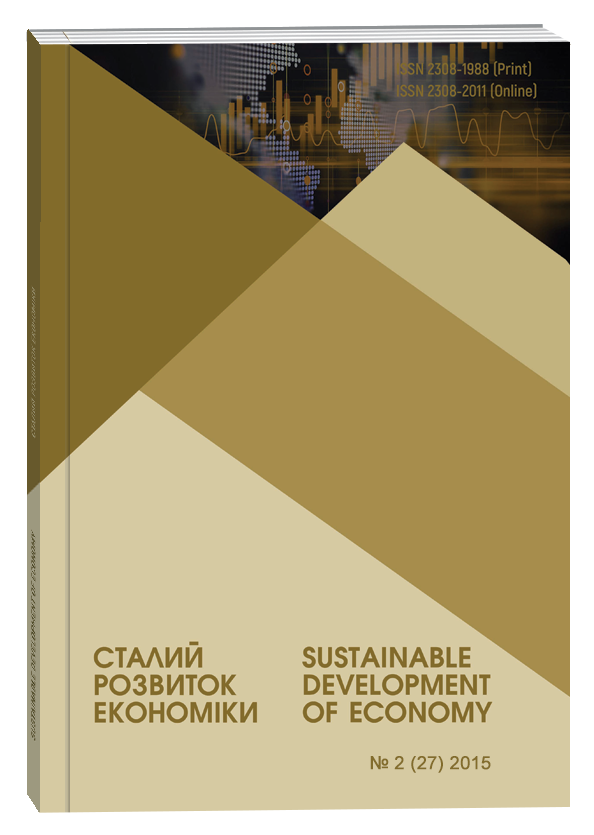ТЕОРЕТИЧНІ ЗАСАДИ ФОРМУВАННЯ СИСТЕМИ МОТИВАЦІЇ ПЕРСОНАЛУ НА ОСНОВІ АНАЛІЗУ МОТИВАЦІЙНИХ ТЕОРІЙ
Анотація
Мета – обґрунтування ролі застосування сучасних груп теорій мотивації для створення ефективного механізму мотивації праці персоналу на підприємствах. Методика дослідження. При дослідженні теорій мотивації використовувався порівняльний аналіз, а при опитуванні працівників за даними Work.ua був використаний економіко-статистичній аналіз. У результаті дослідження було вивчено питання можливості використання в нинішніх умовах господарювання найпоширеніших змістовних та процесуальних теорій мотивації: теорії ієрархії потреб А. Маслоу; теорії набутих потреб Д.К. МакКлелланда; двофакторна теорії Ф. Герцберга; теорії очікування В. Врума; теорії рівності – справедливості (засновник С. Адамс); теорії постановки цілей (Е. Лок, Т. Райен та ін.); теорії партисипативного управління. Результати. Визначено, що мотивація – це сукупність причин психологічного характеру, які пояснюють поведінку людини, її початок, спрямованість і активність. Основним чинником мотивації основної діяльності персоналу є стимулювання, яке означає безпосереднє застосування оптимально підібраного комплексу мотивів і стимулів, що спонукають працівників до ефективної праці. Встановлено, що в теорії мотивації сформовано дві великі групи підходів - змістовні та процесуальні. Змістовні теорії мотивації фокусуються на класифікації первинних та вторинних потреб людини. Процесуальні теорії базуються на потребах і пов'язаних з ними чинниках, що визначають поведінку людей. Наукова новизна полягає в обґрунтуванні ключових напрямів застосування сучасних груп теорій мотивації для створення ефективного механізму мотивації праці персоналу на підприємствах в нинішніх умовах господарювання. Практична значущість. Результати дослідження і запропоновані напрями застосування теорій спрямовані допомогти керівникам зрозуміти потреби і цілі співробітників, і дотримуватись менеджерами певного курсу дій або припинити певні дії, які створюють проблеми в організації. Подальший розвиток змістовних та процесуальних теорій мотивації може забезпечити підвищення рівня задоволеності працею, підвищення мотивації до праці і зниження міграції молодих висококваліфікованих працівників за кордон. В цілому це призведе до покращення основних економічних показників в країні.
Посилання
Бала В.В. Теоретичні засади формування системи мотивації персоналу на основі аналізу мотиваційних теорій [Електронний ресурс] / В.В. Бала, А.Г. Мацак // Економічний форум. – 2014. – № 3. – С. 136-144. – Режим доступу : http://nbuv.gov.ua/j-pdf/ecfor_2014_3_22.pd
Бондар В.Д. Використання мотиваційних теорій у діяльності органів місцевого самоврядування / В.Д. Бондар // Наукові розвідки з державного та муніципального управління. – 2013.
– Вип. 1. – С. 283-293 [Електронний ресурс]. – Режим доступу : http://nbuv.gov.ua/j-pdf/Nrzd_2013_1_24.pdf.
Газгиреева Л.Х. Мотивация как экзистенциальная потенция духовно-нравственного бытия / Л.Х. Газгиреева // Социально-экономические знания. – 2010. – № 5. – С. 219-227.
Гуторов О.І. Сучасні теорії мотивації й особливості їх застосування в умовах ринкового середовища [Електронний ресурс] / О.І. Гуторов, П.О. Абраменко // Вісник Харківського національного аграрного університету ім. В.В. Докучаєва. Сер. : Економічні науки. – 2013. – № 8. – С. 10-17. – Режим доступу: http://nbuv.gov.ua/j-pdf/Vkhnau_ekon_2013_8_4.pdf.
Дигун О. Современие реалии мотивации / О. Дигун // Управление персоналом. – 2011. – № 7. – С. 72-78.
Ильин Е.П. Мотивация и мотивы / Е.П. Ильин. – СПб. : Питер, 2011. – 512 с.
Клименко М.П. Мотивація управлінського персоналу в реалізації загальної стратегії підприємства / М.П. Клименко, О.О. Філатова // Сталий розвиток економіки. – 2011. – № 5. – С. 81-85.
Результаты опроса: денежные поощрения – самый эффективный способ мотивации персонала [Електронний ресурс]. – Режим доступу : http://www.work.ua/news/ukraine/490/.
Bala, V.V. and Matsak, A.H. (2014), “Theoretical principles of forming of the system of motivation of personnel are on the basis of analysis of motivational theories”, Ekonomіchnyi forum, no. 3, pp. 136-144, available at: http://nbuv.gov.ua/j-pdf/ecfor_2014_3_22.pd. (access date May 07, 2015).
Bondar, V.D. (2013), “The use of motivational theories is in activity of organs of local self- government”, Naukovі rozvіdky z derzhavnoho ta munіtsypalnoho upravlіnnia, no. 1, pp. 283-293, available at: http://nbuv.gov.ua/j-pdf/Nrzd_2013_1_24.pdf (access date May 08, 2015).
Gazgireeva, L.Kh. (2010), “Motivation as existential potency of spiritually-moral life”, Sotsialno- ekonomicheskie znaniia, no. 5, pp. 219-227.
Hutorov, O.І. and Abramenko, P.O. (2013) “Modern theories of motivation and feature of their application are in the conditions of market environment”, Vіsnyk Kharkіvskoho natsіonalnoho ahrarnoho unіversytetu іm. V.V. Dokuchaieva. Ser.: Ekonomіchnі nauky, no. 8, pp. 10-17, available at:
http://nbuv.gov.ua/j-pdf/Vkhnau_ekon_2013_8_4.pdf (access date May 10, 2015).
Digun, O. (2011), “Modern realities of motivation”, Upravlenie personalom, no. 7, pp. 72-78.
Ilin, Ye.P. (2011), Motivatsiia i motivy [Motivation and reasons], Piter, SPb, Russia, 512 p.
Klymenko, M.P. and Filatova, O.O. (2011), “Motivation of managerial staff is in realization of general strategy of enterprise”, Stalyi rozvytok ekonomіky, no. 5, pp. 81-85.
Rezultaty oprosa: denezhnye pooshchreniia – samyy effektivnyy sposob motivatsii personala [Results of questioning: money encouragements are the most effective method of motivation of personnel], available at: http://www.work.ua/news/ukraine/490/ (access date May 12, 2015).


